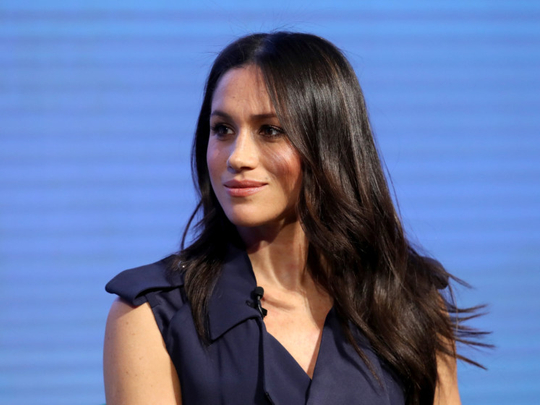
Once upon a time, there was a princess. She had long red hair and a mermaid tail — and if you were near a primary school on World Book Day, you might have seen a six-year-old version of her bombing around the playground. But Ariel is a faintly cautionary figure for wannabe princesses. In the original Disney film of The Little Mermaid, she starts off as an adventurous, even rebellious character, but something changes when she falls for a human prince. Love drives her into a Faustian pact whereby she surrenders her voice in exchange for a human body that makes her more desirable to her man. Spoiler alert: The mute-but-lovable thing does not work out entirely as planned.
Let’s hope Meghan Markle, the newest fairytale princess on the block, doesn’t fall into the same trap. After reports that Prince Harry’s fiancee is not just a committed feminist but is considering giving her own speech at her own wedding, she last week dropped some heavy hints that she will be campaigning on issues to do with “empowering women” when she officially joins the British royal family. She even used her first joint public engagement with Princess Ariel — sorry, the Duchess of Cambridge — to praise the Time’s Up and #MeToo campaigns against sexual harassment. Only 40 years or so after everyone else, it seems, the royal family has finally been alerted to the existence of feminism.
And no, a female-led monarchy isn’t the same thing as a feminist one. After so many decades of being the most powerful woman in any given room, it would be surprising if the Queen held no private views about equality; and they have occasionally floated tantalisingly close to the surface.
The duchess and her future sister-in-law are both 36. Yet, at times like this they seem almost a generation apart: One representing continuity — a life hard to distinguish, in some ways, from her mother’s — and the other standing for change.
It’s not a competition, some gruesome Kate vs Meghan catfight. As wife to the royal “spare” rather than the heir, Harry’s bride has more freedom to push the boundaries. But if the royal family, like Disney, wants to ensure its commercial survival by providing a princess for every audience, then it now has pretty much the full set. For the traditionalists, there’s the reassuring Princess Anne. The duchess, who obediently gave up work to get her man, and now seems chiefly focused on her children, is the Daily Mail reader’s princess. Markle looks set to corner the millennial market as the sparky one you would least mind your daughter aspiring to become.
But it’s not just princesses who, in the first flush of marriage, can be surprised to find themselves quietly conforming to an old-fashioned “wifely” ideal — picking up his dirty socks, and biting back the criticism, for reasons they can’t quite explain. As Markle put it last week, empowering women is less about “giving them a voice” than encouraging them to use the perfectly good voices they already have. And, like Ariel, she may well come under pressure in the coming months to sacrifice her own rather distinctive voice in the name of marriage, particularly if it’s in danger of sounding at all critical.
The younger royals have so far proved rather adept at making themselves more relevant to millennial Britain without straying into politics or scaring the horses. In choosing to campaign against the stigma surrounding mental health, and in Harry’s case to speak openly about his own problems, they picked an issue their parents’ generation might have nervously avoided, but which shouldn’t be shocking or controversial in 2018. Despite some grumbling from the stiff-upper-lip brigade, they have gently helped show their elders that the sky doesn’t actually fall in when difficult emotions are brought into the open. But bridging the generational gap over feminism is a more daunting task.
Like Michelle Obama, Markle is used to having a professional platform in her own right, as an actor and former United Nations ambassador on women’s rights. But even Obama felt compelled to present herself coyly, as “mom-in-chief”, when she entered the White House, giving up paid work and mostly limiting her activism to safe issues such as childhood obesity.
It must have been boring as hell at times, and one hopes the former first lady lets rip a bit in her forthcoming autobiography. But she learned the hard way during her husband’s presidential campaign that millions of voters didn’t want to hear anything more challenging: That some evidently liked her better when she wasn’t portrayed as her husband’s equal, while others sought any excuse to caricature her as an “angry black woman”.
A decade on, we are about to find out whether Britain is ready for a confident, unapologetically feminist, mixed-race woman to occupy a position of considerable soft power. And those grim texts from Jo Marney, the recently deposed United Kingdom Independence Party leader’s on-off girlfriend, complaining that Meghan’s “seed would taint our royal family”, are a reminder of what she is up against. You don’t have to believe in fairytales, or indeed in the monarchy, to hope for a happy ending.
— Guardian News & Media Ltd
Gaby Hinsliff is a Guardian columnist.










